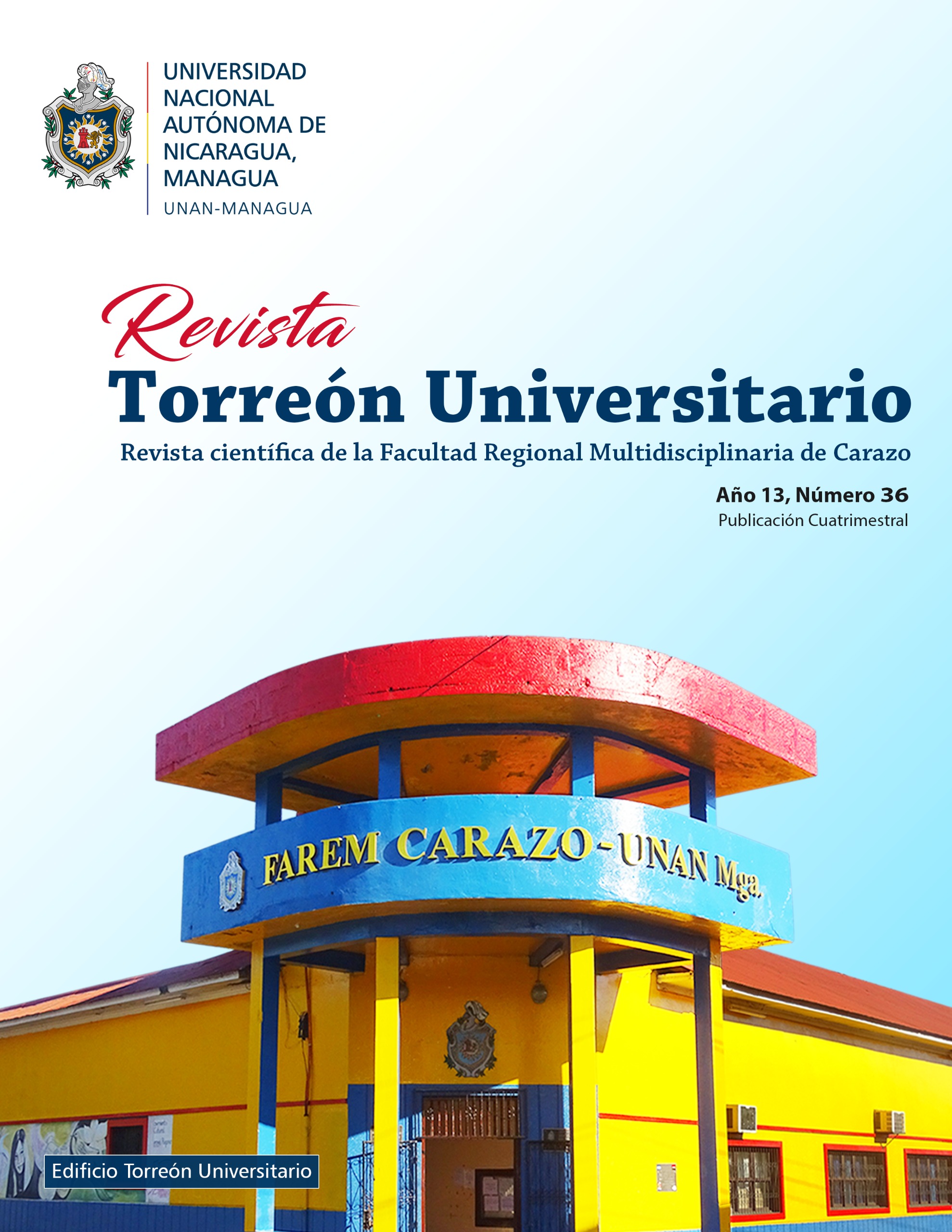Social and economic well-being of self-employed workers in Juigalpa
DOI:
https://doi.org/10.5377/rtu.v13i36.17631Keywords:
Well-being (52), Education (15), Income (77), Health (9)Abstract
The main objective was to determine the social and economic well-being of self-employed workers in the city of Juigalpa. In the introduction, the state of the art is described, following the observational design methodology, not performing manipulation of variables, of a descriptive type, with a quantitative approach, the instrument used was the survey and said information was collected only once during the second semester of 2021, the final participants were 96 self-employed workers, which represented 5% of the population, the results as the discussion they focused on variables Education, health, housing, income, living conditions, well-being and quality of life. Concluding that social well-being prevails, due to the established public policies and the economic well-being product of the income generated from their economic activities.
Downloads
References
Carvajal Calderón, A. N., Cardenas Hernandez, L. Y., & Estrada Cañas, I. (2017). Determinantes socioeconómicos de la informalidad laboral y el subempleo en el área metropolitana de Bucaramanga, Colombia. Equidad y Desarrollo, 1(29), 53-82. doi:https://doi.org/10.19052/ed.417
Font, N. (2018). El Indice de la Feclicidad Nacional Bruta como complemento ante las limitaciones de los modelos socio-economicos tradicionaels. El caso del Reino de Bulan. Journal de Ciencias Sociales , 6(10), 121-132.
Hernández Sampierí, R., Fernánndez Collado, C., & Baptista Lucio, M. d. (2010). Metodologia de la Investigación. McGraw Hill Educación.
Hernández, J. (2017). Calidad de Vida, Inclusión Social y Bienestar Humano. UNERMB.
Ley de Reforma Parcial a la Constitución Politica de la Republica de Nicaragua . (4 de Julio de 1995). Diario Oficial de Nicaragua, num. 124, de 4 de julio de 1995. http://legislacion.asamblea.gob.ni/normaweb.nsf/($All)/927804DC295D0AE5062573080056DA6D?OpenDocument.
Ley Espacial para el fomento de la construcción y de acceso a la vivienda de interes social. (29 de Abril de 2009). Diario Oficial de Nicaragua, num. 80, de 29 de abril del 2009. http://legislacion.asamblea.gob.ni/normaweb.nsf/b92aaea87dac762406257265005d21f7/40fc19c963eeca6a062575c80075b195?OpenDocument.
Limas Hernández, M. (2014). Nuevas rutas hacia el bienestar social, económico y medioambiental: II Foro Bienal de Estudios del Desarrollo. doi:D - Universidad de la República. https://bv.unir.net:2769/es/lc/unir/titulos/93052
Loor-Navas, F. V., Murillo-Mora, M. K., & Cusme-Rodríguez, A. E. (2021). Informalidad laboral, bienestar social y economico de los trabajadores del sector construcción. Revista Cientifica Dominio de las Ciencias, 7(4), 289. doi:DOI: http://dx.doi.org/10.23857/dc.v7i6.2331
Malhotra, N. K. (2008). Investigación de Mercado . Pearson Educación .
Mejia, J. T. (2021). Investigación descriptiva: características, técnicas, ejemplos. Obtenido de https://www.lifeder.com/investigacion-descriptiva/
Morales Navarro, J. (1994). Sociedad y Bienestar : El concepto de Bienestar. 27, 603-611.
Oviedo, H. C., & Campos Arias, A. (2005). Aproximacion del uso del coeficiencia alfa de Cronbach . Revista Colombiana de Psiquiatría , 34(4).
Rangel, R., Borge, A., & Fernandez, M. (2017). Salud y seguridad social de los trabajadores informales del centro de. Salud de los trabajadores, 25 (1), 37-51 .
Real Academia Española. (24 de Junio de 2022). Obtenido de https://dle.rae.es/bienestar
Vielma, R. J., & Alonso, L. (2010). El estudio del bienestar psicologico subjetivo: Una breve revisión teórica. Educere, 14(49), 265-275.
Downloads
Published
Issue
Section
License
Copyright (c) 2024 National Autonomous University of Nicaragua, Managua

This work is licensed under a Creative Commons Attribution-NonCommercial-NoDerivatives 4.0 International License.
The authors who publish in this journal agree to the following terms.
- The author or authors of the articles, essays or research grant the National Autonomous University of Nicaragua, Managua (UNAN-Managua) the editing rights (copyright) of the submitted work, therefore the University has the exclusive right to publish the article for the entire copyright period.
- These copyrights/authors authorize Torreón Universitario Magazine and the University to edit and disseminate/publish the article in said Magazine, including printed and electronic reproduction, storage, retrieval and any other type of publication, and sources of secondary information as services. of summaries and databases, they also empower it to protect the article against unauthorized use for dissemination by printed or electronic media (PDF, HTML, EPUB, XML or others).
License for use of content
The magazine uses the Creative Commons Attribution-NonCommercial-NoDerivs 4.0 International License.
Under this statement:

This journal is licensed under a Creative Commons Attribution-NonCommercial-NoDerivatives 4.0 International License. It can be copied, distributed and transmitted publicly as long as the author and source are cited (Revista Torreón Universitario), it should not be modified or used for any commercial purpose. The full license can be found at http://creativecommons.org/licenses/by-nc-nd/4.0/.



